Not Supporting Gaza May Lead To Conflict With Israel In Iran - Official
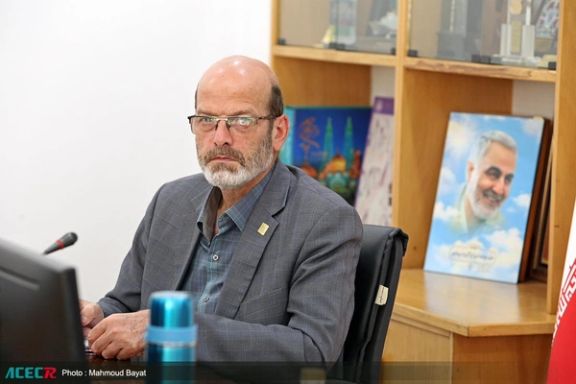
A senior Iranian official has said it is a “duty” to help the people of Gaza, and warned otherwise Iran may face a threat within its borders from Israel.

A senior Iranian official has said it is a “duty” to help the people of Gaza, and warned otherwise Iran may face a threat within its borders from Israel.
The remarks by Hassan Moslemi Nayini, the اead of the Academic Center for Education, Culture, and Research, echo the rhetoric around Iran’s intervention in the Syrian civil war.
Back then Iranian officials justified their actions in the Syrian civil war by stating that failure to act there would result in a conflict within Iran.
In 2011, Iran intervened in Syria, sending thousands of fighters and weapons to support the government of Bashar al-Assad. The move was framed as a preventive measure against the rise of ISIS, which had gained ground in Syria and Iraq.
Qasem Soleimani, the former IRGC Quds Force Commander, played a significant role in Iran's intervention in Syria. Initially acting as an advisor, Soleimani later spearheaded a large-scale military involvement in the Syrian civil war, drawing criticism for involvement in civilian casualties.
Soleimani's death in a 2020 drone strike ordered by then-President Donald Trump heightened tensions between the United States and Iran. Since then, militant groups backed by Iran have attacked US bases in the region many times.
Iran supports groups such as Hamas and Hezbollah, both with ties to Palestinian factions in Gaza. While Iran backs such groups, it denies direct involvement in recent events, including the October 7 terror attack that escalated the current crisis in the region.
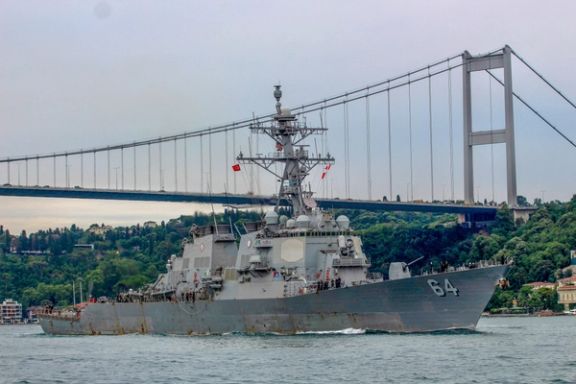
Yemen’s Houthis fired two missiles that missed a commercial tanker carrying jet fuel and headed for the Suez Canal, Associated Press quoted a US official as saying.
A US Navy warship also shot down a suspected Houthi drone flying in its direction during the same incident, the official said. These incidents came after repeated threats to shipping issued by Houthi officials in the past two days.
The tanker, Ardmore Encounter, was transporting Indian-made jet fuel apparently not destined for Israel. When Iran-backed Houthis began their attacks on vessels last month their declared targets were ships bound for Israel. However, recently they threatened all shipping passing through the Red Sea. The Ardmore is reportedly headed for Europe.
The Marshall Islands-flagged tanker was also threatened by skiffs loaded with men trying to board the vessel, AP reported. The tanker had armed guards on board who fired on the would-be hijackers and drove them off. The Ambrey private intelligence firm said that “No one boarded the vessel, and all crew members are safe and accounted for.”
Although Iran has avoided direct military involvement in the Gaza war despite its long-standing threats against Israel, its armed proxy forces in Iraq, Syria and Yemen have launched more than 90 attacks. US bases in the region and international shipping have been targets for Iran’s “Resistance Front.”
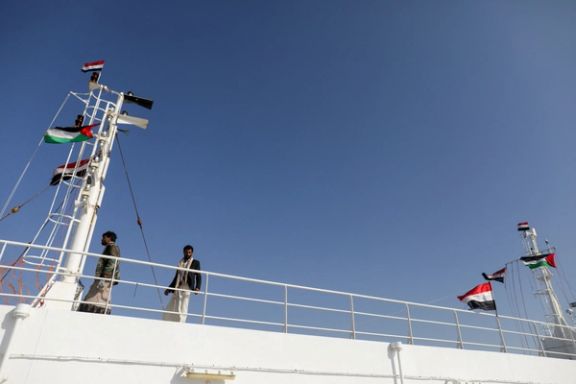
Yemen’s Houthis fired two missiles that missed a tanker carrying jet fuel and headed to the Suez Canal, a US official was quoted as saying by the Associated Press.
A US Navy warship also shot down a suspected Houthi drone flying in its direction during the same incident, the official said. These incidents came after repeated threats issued by Houthi officials in the past two days.
Earlier on Wednesday, a Houthi official said his group possesses “formidable leverage” against countries that participate in a naval coalition in the Red Sea.
Mohammed Al Bukhaiti issued the threat after news emerged that the United States was discussing a naval coalition with 12 countries to protect shipping in the Red Sea. The Houthi official was speaking to Sama News, a Palestinian outlet.
Iran-backed Houthis have launched numerous attacks against commercial vessels in the strategically vital shipping lanes in retaliation for Israel’s military operation in Gaza.
On Tuesday, a senior official from Yemen's Houthis warned cargo ships in the Red Sea to avoid traveling toward Israel, after the group claimed an attack on a commercial tanker earlier in the day.
The Houthis earlier said they hit a Norwegian commercial tanker with a missile in their latest protest to Israel's bombardment of Gaza, underlining the risks of a conflict that has shaken the Middle East.
Al Arabiya has reported that according to a Pentagon official, the Biden administration is in talks with 12 allied countries to form a task force to secure the passage of commercial vessels in the Red Sea.
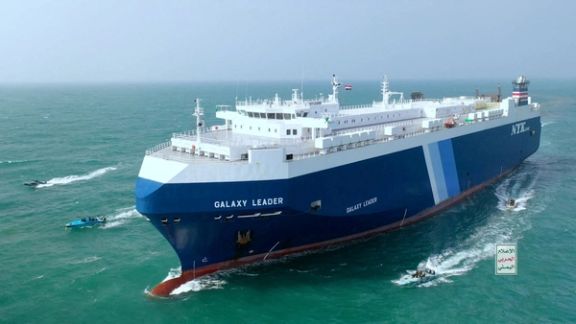
However, the Houthis mostly attack the vessels with missiles and drones and navies trying to protect the shipping lanes need to be able to shoot down every incoming projectile. This would not fully secure the right of safe passage, as long as Houthis are not deterred to seize their attacks.
Biden administration critics have argued for retaliation against Houthis and other Iranian backed militia forces in the region. Militant groups in Syria and Iraq have launched around 90 attacks so far against US bases, with a few US retaliatory strikes.
The US administration, however, seems to be relying more on diplomatic contacts to prevent the attacks. On Wednesday, Secretary of State Antony Blinken spoke with Iraqi Prime Minister Mohammed Shiaa al-Sudani, condemning a recent attack on the US embassy in Baghdad, as well as the series of attacks on American personnel in Iraq and Syria.
An announcement by the State Department said, “The Secretary noted that the attacks are being carried out by militias who are acting with the support of Iran and undermining Iraq’s sovereignty and independence. They committed to remain in close contact over the coming days and weeks.”
The attacks in the Red Sea have overshadowed rocket and drone attacks against US forces. In addition to avoid heading toward Israel, which the Houthis referred to as "occupied Palestine", ships that pass Yemen should keep radios turned on, and quickly respond to Houthi attempts at communication, Mohamed Ali al-Houthi, head of Yemen's Houthi supreme revolutionary committee, said in a message on the X social media platform.
Al-Houthi also warned cargo ships against "falsifying their identity" or raising flags different from the country belonging to cargo ship owner.
The Iran-backed group attacked the tanker, the STRINDA, because it was delivering crude oil to an Israeli terminal and after its crew ignored all warnings, Houthi military spokesperson Yehia Sarea had previously said in a statement.
The Houthis have waded into the Israel-Hamas conflict - which has spread around the region - attacking vessels in vital shipping lanes and firing drones and missiles at Israel more than 1,000 miles from their seat of power in the Yemeni capital of Sanaa.
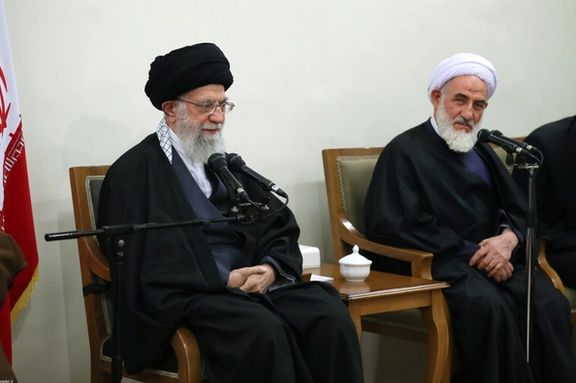
A man convicted for the murder of an aide to Supreme Leader Ali Khamenei has been executed in Iran.
Abbasali Soleimani, a former representative of the Guardian Council, was shot dead at a bank in Babolsar in April.
The execution took place on Wednesday morning in Babol prison, in the presence of members of Soleimani's family, according to a report by Mizan news agency, which is affiliated with Iran’s judiciary.
Judges of the Islamic Republic had endorsed the "Qisas" (retaliation in kind) sentence for the perpetrator. The Supreme Court upheld the decision.
Various narratives surrounding the assailant's motive have circulated within Iran. Hamshahri newspaper, affiliated with the Tehran Municipality, suggested a day after the incident that the murder stemmed from a disagreement between the bank guard and the bank's deputy "over work-related issues". The killer is said to have mistaken Solimani for the brother of the bank's deputy.
An alternative account surfaced on social media, suggesting that Solimani went to the Babolsar branch of Bank Melli to withdraw 34 billion rials (approximately 70,000 USD) in cash. Reportedly, after being told by the bank's director that the requested amount was not present in the branch, a financially struggling retired police sergeant shot him dead.
A video from inside the bank displayed the guard calmly approaching Solimani, seated on a chair, and shooting him. Bystanders promptly detained the assailant, who offered no resistance.
The killing of Abbasali Soleimani was part of a series of attacks on clerics which have taken place across various Iranian cities since Women, Life, and Freedom protests began last year.

Iran has quadrupled its oil revenue since President Joe Biden took office, helping the regime better fund its malign activities, a Congressional hearing was told on Tuesday.
China buys almost three-quarters of the Iranian crude oil shipments, according to experts’ testimony at the hearing, making the most of the Biden administration’s reluctance to antagonize Tehran.
“The Biden administration has taken a consistently weak approach to enforcing the energy sanctions that would have the strongest economical impact on Russia, Iran and Venezuela,” said Rep. Blaine Lutkemeyer, chairing the hearing.
“Iran has been emboldened to throw its weight around the Middle East from Yemen to Gaza, with it or its proxies directly attacking US military sites and warships essentially without consequences,” he added.
The hearing was entitled Restricting Rogue-State Revenue: Strengthening Energy Sanctions on Russia, Iran, and Venezuela. It was hosted by the US House Financial Services Subcommittee on National Security, Illicit Finance, and International Financial Institutions.
Recent data show that “due to diminished sanctions enforcement, Iran has accumulated north of $80 billion dollars in oil revenues since 2021,” said Claire Jungman, chief of staff of United Against Nuclear Iran (UANI).
Investigations by United Against a Nuclear Iran (UANI), an advocacy group in Washington, suggest that Iran has between 300 and 400 “foreign owned and foreign flagged oil tankers shifting its oil.” These are called the “ghost fleet,” vessels that operate under the radar and are not sanctioned by the US.
Almost half these vessels are flagged by Panama – in the US backyard.
Last week, 15 Members of Congress called on the US Secretary of State Antony Blinken to crack down on a “ghost armada” of ships that evade sanctions and find ways to hold Panama accountable for their complicity in Iranian funded terrorism.
Biden critics say his Iran policy has had disastrous consequences for the region and beyond. They argue that Hamas –funded primarily by Iran– could not have pulled off the horrors of 7 October without support from a regime flush with new cash.
Since October 17, militant groups backed or affiliated with the Islamic Republic have attacked American troops 92 times with little or no retaliatory operations by the US.
“The Iranian regime is largely unconstrained and unfettered from a resource standpoint, said Marshall Billingslea, former assistant secretary of the Treasury for terrorist financing. “They’ve gone right back to where they were after the JCPOA was enacted by the Obama administration.”
The JCPOA (or the Iran nuclear deal) was signed in 2015. President Trump ripped it off shortly after taking office and introduced the Maximum Pressure campaign to squeeze the Islamic Republic. After Trump, that campaign was abandoned for a more lenient policy that was hoped to set the scene for a return to some form of a nuclear agreement.
Rep. Dan Meuser said this thinking was flawed. “Our foreign policy prioritizes appeasement over strength. Appeasing hostile regimes does not bring peace, but undermines it.”
Last September, the Biden administration released $6 billion in frozen Iranian oil money to help facilitate the return of five Iranian-Americans held hostage in Tehran. The decision was opposed vehemently by Republicans who said the money would be used for malign activities, regardless of any restricting stipulations in the deal.
Democratic Congresswoman Joyce Beaty countered this in the hearing.
“Under the Biden administration, the US maintained the most extensive set of comprehensive sanctions against Iran, including those related to the illicit sales of Iranian oil,” Rep. Beaty said. “Contrary to accusations leveled by the Republicans, Secretary [of the Treasury] Yellin recently set the record straight that we have not in any way relaxed our sanctions on Iranian oil.”
However, the issue, as set forth by experts at the hearing, is primarily “enforcement” of the sanctions when it comes to Iran.
“The real problem for Iran is not that they’re getting $6 billion into the system,” said Adam Smith of Partner, Gibson, Dunn & Crutcher, “it’s their ability to use that $6 billion to buy things, to send to Hamas, to send to Houthis, etc.”
Chairman Lutkemeyer agreed. “The United States and its allies should return to an approach of strongly reinforcing energy sanctions against these rogue regimes to weaken our enemies,” he said.
Another lawmaker, Rep. Zach Nunn, who has introduced a bill to enhance sanctions enforcement, highlighted the need for new technologies to improve surveillance and tracking (of ghost fleets, for instance) as a necessary step to keep up with increasingly sophisticated methods used by Iran to circumvent sanctions and sell oil.
Such practical considerations, however, are secondary. The real issue is not so much the capabilities than is willingness to change course. And that’s what many critics of the Biden administration say is missing.
“Autocratic regimes have for years tried to advance the narrative that sanctions don’t work,” said Billingslea, “And now some in Washington DC are beginning to parrot their talking points… Sanctions do work when applied properly and enforced.”

A former Iranian official, implicated in smuggling 2.4 tons of gold, returned from Canada where many individuals linked to the Islamic government have found refuge.
Mostafa Niazazari, recently back in Iran, was a key figure in the Tabari network, named after Akbar Tabari, the Judiciary’s former Executive Vice President and Finance Director for over two decades. His network orchestrated a massive corruption and bribery scheme involving numerous officials, most of whom evaded accountability, as is often the case with individuals tied to the Islamic Republic. Transparency International ranked Iran 150th out of 180 countries in its 2021 Corruption Perception Index as one of the world's most corrupt countries.
Niazazari's return garnered significant coverage in Iran's state media, with one newspaper labeling him an "asset" of the Islamic Republic. The reformist daily Shargh quoted him as saying, "Ambiguities related to Mr. Tabari's case have been resolved, and obstacles to return have been eliminated."
Living in a $7-million mansion in Canada's West Vancouver since fleeing Iran during Tabari's investigation, Niazazari represents a pattern of Iranian officials seeking refuge in Canada for good or until they can safely return. His office in the same city is valued at $5 million.

Despite Canada’s measures to deny entry to officials of the Islamic Republic, the country remains one of the safe havens of regime officials who are at their low in their relations with the government in Trehan. Most of Ottawa’s restrictions do not lead to tangible results because the ban on regime officials “applies to those who were senior officials at any time from November 15, 2019, onwards,” limiting the punitive impact of the measure.
In 2019 and 2020, a wide-ranging investigation and trial implicated dozens of individuals in corruption schemes that took place during the tenure of former Judiciary chief, Sadegh Amoli Larijani, who was removed from his post in early 2019. The Larijani family enjoyed unparalleled power and influence for more than a decade. Another brother, Ali Larijani was Speaker of Iran’s parliament until May 2020. The case was perceived as a deliberate effort to undermine the Larijani family.
Ebrahim Raisi, then the new chief justice, ordered the arrest of Tabari in July 2019. In addition to his 31-year sentence for corruption and bribery, Tabari received 12 years of prison time for money laundering and 15 years for other crimes, giving a total of 58 years -- although according to law he will serve only 31 years. In June 2023, the judiciary announced that Tabari was released from prison after serving just 45 months after posting a bail equivalent to $6 million. In August, his sentence was revised to 12.5 years, and he returned to prison.
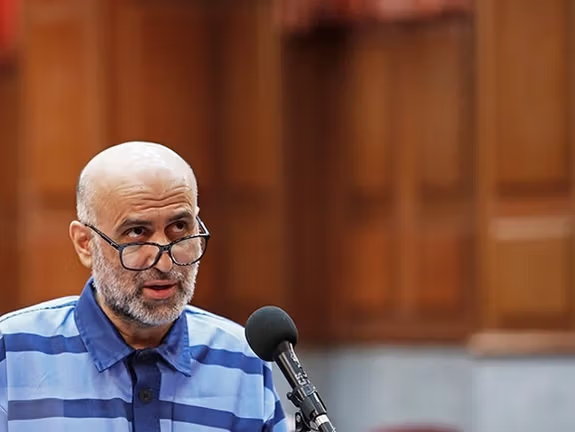
During the course of the case, Niazazari was convicted for smuggling two metric tons of gold into Iran as well as bribery. According to the prosecutor's office, Niazazari had reportedly given five lots of land totaling 15,000 square meters as well as three villas in the northern city of Babolsar to Tabari as a bribe. His father, Kiumars Niazazari, who was the head of the intelligence department in Mazandaran province from 2006 to 2016, was also arrested at the time.
Niazazari was first arrested in December 2011 at the age of 32 on charges of smuggling, money laundering, obtaining credit with fake documents, and bribery. He had established a cover company named Vizor, managed by his wife, in Dubai and had secured discounted foreign currency from the Central Bank of Iran on 31 occasions and transferred the funds to the company's account in the UAE, instead of spending the money on imports as he was supposed to.
When Tabari, using his money and connections, pulled some strings to sweep his case under the rug, Niazazari was acquitted of all charges and released.
The reduction of Tabari’s sentence to a fraction of his original prison term and a hero’s welcome for Niazazari suggest a recurring pattern of recycling financial corruption ringleaders by the Islamic Republic. Large-scale corruption cases in Iran tend to surface around election time, raising suspicions that authorities play these cases like chess moves to remove or empower certain candidates. Analyst Amirhadi Anvari referred to the recently revealed $3.5 billion embezzlement case of Debsh Tea Company as a means to purge political rivals through exposing their wrongdoing.